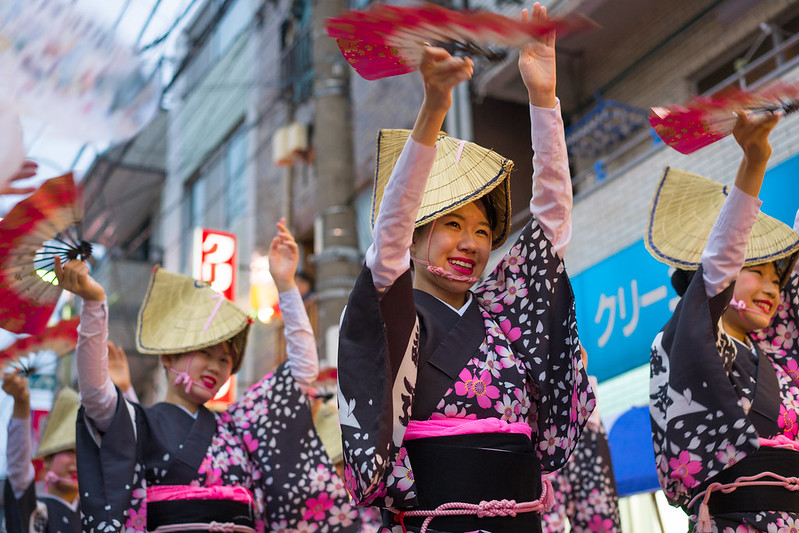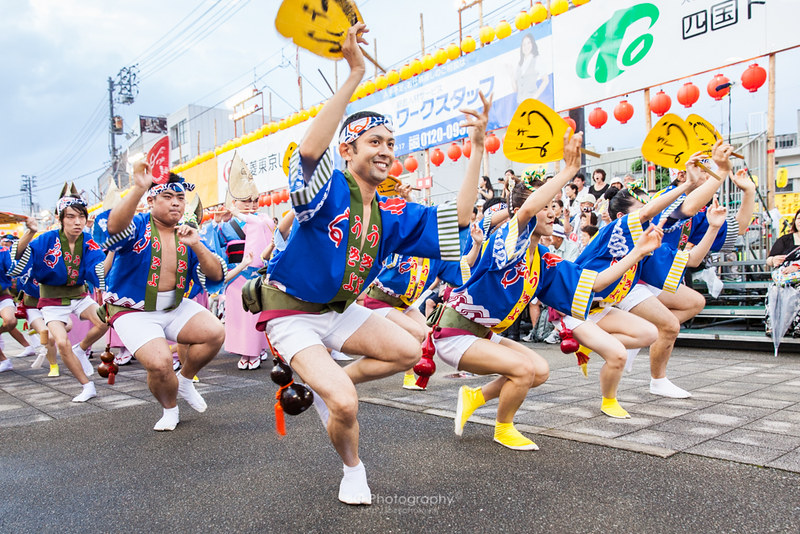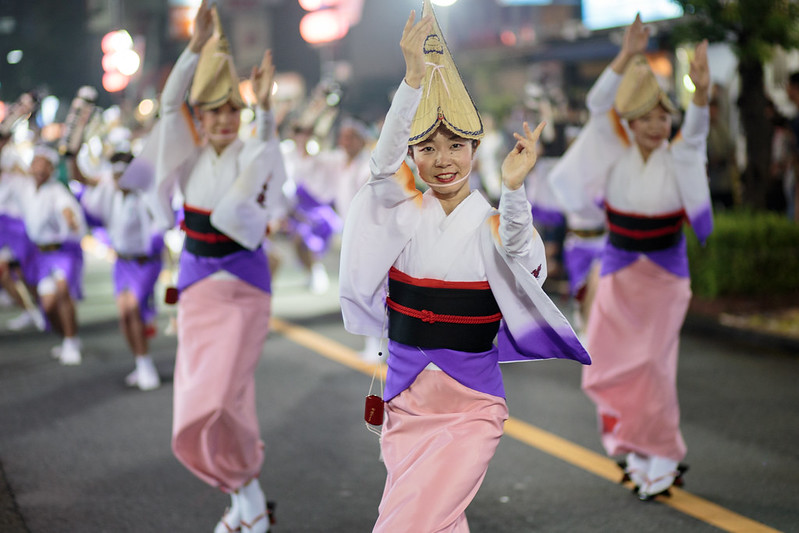Awa Dance Festival
The Dancing Festival That Sets Tokushima’s Nights Alight with Joy and Energy
2026/08/10 - 2026/08/14
Every August, Tokushima City on Shikoku becomes a vibrant stage for Awa Odori, Japan’s most exuberant dance festival. For four nights, locals, visitors, and dancers from across the country fill the streets with movement, laughter, and the infectious rhythms of taiko drums and flutes. Whether you’re a festival lover, a traveler eager to experience Japanese culture, or a family seeking summer fun, Awa Odori is an event where anyone can join the circle and feel the pulse of true Japanese summer.
The festival runs from August 12 to 15, coinciding with Obon. As dusk falls, Tokushima comes alive with lantern light, festival music, and the famous chant, “The fool dances, and the fool watches…,” as excitement surges through the city. The aroma of festival street food, the feel of yukata and happi coats, and the high spirits of the crowd fill the night air.
Main Attractions
Ren Dance Parades & “Niwaka Ren” Participation
The heart of Awa Odori is the nightly parade of “ren” dance troupes. From local neighborhood groups to professional teams, each ren performs its own unique style to live shamisen, taiko, flute, and bell music. From 6pm to 10pm, hundreds of ren and tens of thousands of dancers wind through special performance zones and shopping streets, with spectators clapping and calling out in rhythm.
Opening ceremonies, famous ren performing on stage, and the “Niwaka Ren”-open to anyone who wants to join-are also highlights. True to the festival’s motto, “The fool dances and the fool watches; if both are fools, you might as well dance!”, joining in is the best way to experience the fun.
Costumes, Decorations, and Festival Atmosphere
Awa Odori is a feast for the senses. Women wear yukata with woven hats and geta sandals; men wear happi coats, shorts, and hachimaki headbands. Each ren has its own colors and style. Lanterns and flags light up the night, applause and singing echo through the streets, and even spectators join in with clapping and cheering.
Cultural and Historical Background
Awa Odori boasts a history of over 400 years. The most famous origin story dates to 1586, when Lord Hachisuka Iemasa celebrated the completion of Tokushima Castle by giving sake to the townspeople, who began to dance and sing in the streets, regardless of class or age. Another theory links Awa Odori to Bon Odori, the Buddhist dance for honoring ancestors during Obon, which developed its own lively, free style in Tokushima. During the Edo period, Awa Odori became famous throughout Japan as “Awa’s elegant dance,” and even faced bans in the Meiji and Taisho eras due to its wild popularity, but each time the people revived the tradition.
After World War II, Awa Odori grew into a major tourist event centered in Tokushima City, now drawing over 1.3 million people each year and ranking among Japan’s largest dance festivals. For Tokushima locals, Awa Odori is far more than a summer event-it is a living tradition that celebrates joy, remembrance, reunion, and the bonds of community and family. The rhythms, chants, costumes, and music all carry the spirit of Tokushima’s history and the joy of dancing together.
Participant Voices
I wanted my kids to experience real Japanese culture, so I brought them to Awa Odori. They were fascinated by the costumes and music, and dancing together in the Niwaka Ren was our best memory.
Fun Facts
- You can enjoy live performances and hands-on experiences at the Awa Odori Kaikan in Tokushima City all year round.
Festival Dates
Awa Odori is held every year from August 12–15 in central Tokushima City. The nightly parades and performance zones are the main highlights-don’t miss the summer excitement of Tokushima.
The event schedule is subject to change. Please check the official website for the most up-to-date information.
Information
| Name | Awa Dance Festival |
| Country | Japan |
| Area | Tokushima, Awa Odori Kaikan |
| Date | 2026/08/10 - 2026/08/14 |
| Link |
Upcoming Festivals
Kukeri(Surva) Bulgaria
Bulgaria’s Festival of Spirits, Fire, and Bells That Drives Away Winter
2026/01/22Dinagyang Philippines
Iloilo’s Thunderous Festival of Faith, Tradition, and Dance
2026/01/22The Northern Lights Festival (Nordlysfestivalen) Norway
A Tromsø Miracle: Music and Aurora Dancing in the Arctic Night
2026/01/25Carnavales de Ituren y Zubieta Spain
Ancient Echoes and the Festival that Awakens Spring in the Basque Mountains
2026/01/26Up Helly Aa United Kingdom
A Night When Fire and Viking Pride Blaze in Shetland
2026/01/29Winterlude Canada
A Wonderland of Ice, Light, and Smiles in Canada’s Capital Region
2026/01/30Carnival of Viareggio (Carnevale de Viareggio) Italy
A Spectacular Parade of Giant Papier-Mâché Masterpieces
2026/01/30Fiesta de la Candelaria(Virgin of Candelaria) Peru
A Grand Dance Festival of Faith and Folklore Echoing on the Shores of Lake Titicaca
2026/01/31Thaipusam Malaysia
A Pilgrimage of Prayer and Penance Illuminates Batu Caves
2026/01/31Jaisalmer Desert Festival India
When Rajasthan’s Golden Dunes Dazzle with Color and Culture



